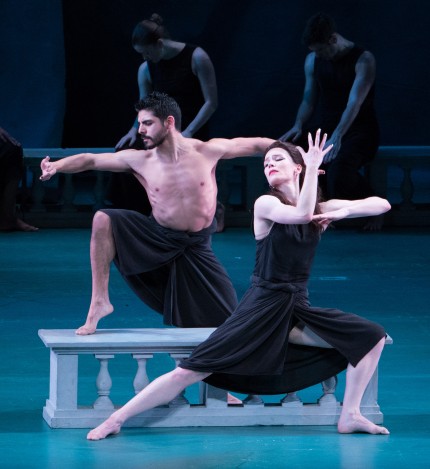Dance and singing effective but fail to cohere in Mark Morris “Dido”

Few operas are a better bet to gracefully unite singing and dancing than Dido and Aeneas. One of the earliest operas to maintain a hold in the repertory, Henry Purcell’s masque-like tale of the doomed lovers contains as many Terpsichorean and dance-friendly interludes as arias and choruses. The opera’s 70-minute concision and straightforward scenario likewise make it ideal for dance ensembles.
In its second and final performance of Dido and Aeneas Wednesday night at the Harris Theater, the Mark Morris Dance Group and Music Ensemble offered a sturdy performance with equally inspired dance and music values.
Morris’s choreographed Dido has been a cornerstone work for his ensemble since its 1989 Brussels premiere with Morris also dancing the roles of Dido and the Sorceress.
Laurel Lynch took on the dual roles Wednesday night. The statuesque, flame-haired dancer brought an androgynous grace to the doomed Dido with her fluid line and long-limbed movements, as well as a twisty, aggressive physicality to the jagged, violent movements of the Sorceress.
Fluent and accomplished as the dancing was by the ensemble, the choreography’s moments of post-modern irony often failed to reflect or effectively cohere with the stoic tragedy of the tale itself. So too, the music and dance elements worked well but too often existed in uneasy parallel universes. Morris’s vital and inventive choreography for the chorus/ensemble often seemed more apt and on target than the solo and duo moments.
Of the other dancers, Domingo Estrada, Jr. was a restrained and elegant Aeneas, and the most in synch with the Classical (and classical) origins of the Purcell opera. Michelle Yard was a worthy Belinda, Lauren Grant a lively Sailor.
The musical side was largely consistent. The singers and excellent chorus were stationed in the raised Harris pit with the chamber orchestra, which was led with authority and lithe Baroque style from the harpsichord by Colin Fowler.
Jamie Van Eyck sang sensitively and displayed a youthful timbre as Dido, doubling as the Sorceress, like her dance counterpart Lynch. Yet the mezzo’s enunciation was cloudy at best and, often her words were so indecipherable, one could barely understand the English text.
Douglas Williams was a terrific Aeneas, singing with a firmly placed bass-baritone and forthright style that suited the character. Equally effective were Sherezade Panthaki as a refined Belinda, Jason Weisinger as a twangy, characterful Sailor, and Marguerite Krull in supporting roles.
Posted in Performances




